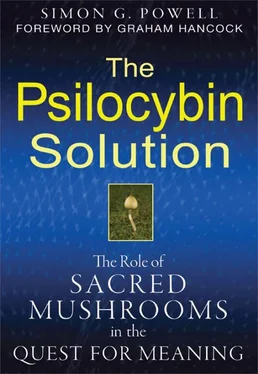Since the human brain is complex enough to embody intentional intelligence and since much of its firing activity can only be understood in the light of its intentional intelligence, I believe it tenable that, in an analogous way, evolution itself represents the ongoing intent of an intelligence somehow distributed throughout Nature, and brought into focus through the biosphere (or any biosphere for that matter). In other words, somewhat like Hoyle suggested, the evolutionary process that has dominated the surface of the Earth is the articulation of an intelligence of some kind.
Returning to purely biological evolution, the idea that this process represents an intelligence in action is not to deny the reality of natural selection. Far from it. After all, to argue against natural selection (the process whereby certain genetic variations and mutations are favored due to their ability to better replicate themselves) is to commit perhaps the cardinal sin against the life sciences. I would not dare embarrass myself like that. No, I am simply suggesting that evolution through lengthy sequential instances of natural selection represents a natural intelligence in action as opposed to, say, human intelligence in action.
If we selectively breed dogs or cats, then we are carrying out a process of artificial selection whereby we select those animal features that we would like to see strengthened. In the case of selective breeding, therefore, human intelligence governs the process. In the biosphere at large, natural selection governs the process of evolution over longer stretches of time than artificial selection. Biological evolution is slow—exceedingly slow. So slow in fact that we can’t really see evolution happening. Whereas this is taken to mean that Nature is essentially dumb and mindless, I believe that we can view Nature in its entirety as a form of active intelligence, though of an order of magnitude well above that displayed by our species. And by “Nature in its entirety,” I mean that we can view the biosphere as a continuum within which individual organisms are in fluidic connection with each other and their surroundings. Influences pass in all directions. There is but one interconnected system in which evolution occurs. Remember our River of Life metaphor, in which all forms of the water were part of a coherent, interconnected whole? This is how we can think of the biosphere, as representing a single sensible system in which information is continuously being churned and integrated into greater and greater patterns of coherence and complexity. Moreover, natural selection can be interpreted as natural intelligence at work, quite literally a response of Nature to its own significant contextual configuration. In other words, the environment, as a context, always serves to highlight the sensibleness of certain genetic variations and thence sustain them—rather like the way our minds will spot and highlight a word amongst a scattering of random letters. This being so, genetic changes that lead to some kind of sensible life-enhancing behavior will tend to persist and have the opportunity to further evolve within any gene pool. Because Nature represents a meaningful and ordered contextual system (in other words, it is intelligently configured), evolutionary events can unfold in response to that meaningful context. Indeed, the very tree of life germinated in accordance with this significantly configured context.
The Importance of Context
To get a firm handle on this highly salient notion concerning intelligent contexts, consider that well-worn story of the monkey at the typewriter. We are asked to imagine this monkey typing feverishly away at random for ages and ages, most of the time producing gibberish. Eventually we can see how, by pure chance, the monkey manages to type some words or even a short meaningful sentence (in which case any grinning on the monkey’s part becomes suddenly apt). Now, although this story is meant to show how meaning can be generated from a nonmeaningful system by pure chance (meaning coming out of nothing and for free), this is patently not true. Indeed, if one can grasp why such reasoning is false, one will simultaneously grasp the point I have been driving at—namely that Nature is an intelligently configured contextual system guaranteed to grow the tree of life by highlighting its sensibleness.
In the monkey yarn, we do not get meaning out of nonmeaning. Far from it. First, we have two meaningful systems from the outset: the monkey and the typewriter. Second, and more important, it is the context of the human psyche that gives meaning to the typed responses of the monkey . This means that one is not getting meaning out of thin air, but that there was a priori meaning present in the system of monkey, typewriter, and us-as-observer. It is precisely this a priori meaning—in the form of an intelligent and patient observer—that serves to highlight that tiny fraction of the monkey’s typed responses that make sense. If there is no meaningful context surrounding the monkey and its typed output (that is, no intelligent observer is present), then no meaning can be highlighted and thus nothing that the monkey types will ever make any sense.
The same holds true for evolution. If Nature were not already a sensibly configured system, if Nature were not highly organized in terms of its laws and its lawful logical relations, then organisms and DNA-writ structures would not make any sense. That they do make such good sense and that more and more sense can be made through organic evolution reveals the a priori intelligently configured context provided by Nature . As an all-surrounding context, Nature notices and minds, as it were, what happens within it, in the same way we would notice if a monkey typed something sensible. In this way, Nature selects sensible changes to genomes, those variations and modifications of DNA that yield life-affirming behavior. If the reader can grasp this, the notion of natural intelligence—the ultra-smart quality of Nature—becomes self-evident, and everything that we take for granted changes.
It is apparent that Nature has an unfailing contextual capacity to continually select smarter and smarter biological forms. Look at the evolution of the hominid brain, for instance. The remarkable evolution from cortex version 1.0 to, say, cortex version 7.0 happened only because the environment continually and invariably selects genetic changes that enhance a brain’s ability to make sense of the intelligible information that the environment provides. Thus, environment and evolving organ (or evolving organism) are part of one interconnected fluidic system. This role of environmental context in cultivating the evolution of complex living things is unfortunately taken for granted by most evolutionary thinkers. In other words, it is not usually remarked upon just how much a role Nature, as an environment, plays in the evolutionary process. It surely did not have to be that way, for we can imagine a state of affairs in which Nature would not continually foster the evolution of complexity—in the same way that we can imagine a monkey typing away at a typewriter for eternity and never ever making written sense because there is no context available with which to highlight any sense.
It seems though that Nature is arranged in a way that literally demands that a real kind of self-stimulation occurs in which information—in the form of genotypes in this instance—continues to organize itself due to continual contextual feedback from the environment, that is, the combined system of organisms and the environment feeds back upon itself and provokes ever-more evolutionary progress. In this way organisms can continually evolve and become smarter, because the environment surrounding them acts as the context that highlights and sustains newly sensible structures and newly sensible behaviors. By making biological and behavioral sense within the larger context in which they are embedded, organisms can be selectively evolved. The point to bear in mind is that sense and meaning of one kind are clearly required in order to elicit further forms of sense and meaning. Only meaning can beget meaning; only intelligence can beget intelligence; only something smart can construct something else that is smart. The fabric of Nature is therefore smart throughout (some of these smart qualities were discussed in previous chapters and were referred to as the Universal Computation).
Читать дальше










